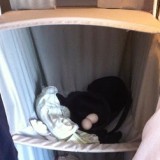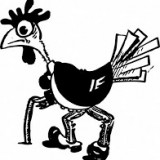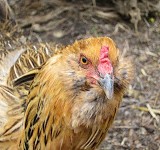 Yes, indeed hens make noise. Far less than a rooster, but when it comes time to lay an egg you often get the stereotypical hen vocalization, technically known as “cackling,” which goes something like, “cluck, cluck, cluck, CLUCKAAAAAWWWWK!” Thankfully this only happens around laying time, which for our three productive hens is no more than once a day, and usually at a respectable time between around 9 a.m. and 2 p.m. Some of our club hopping neighbors may get an early than wanted wake-up call, but so far nobody has complained.
Yes, indeed hens make noise. Far less than a rooster, but when it comes time to lay an egg you often get the stereotypical hen vocalization, technically known as “cackling,” which goes something like, “cluck, cluck, cluck, CLUCKAAAAAWWWWK!” Thankfully this only happens around laying time, which for our three productive hens is no more than once a day, and usually at a respectable time between around 9 a.m. and 2 p.m. Some of our club hopping neighbors may get an early than wanted wake-up call, but so far nobody has complained.
Being naive first time chicken owners, the first time we heard this sound caught us by surprise. We suspected that it’s the result of discomfort from squeezing out an egg, or some wonder of selective breeding, a way to announce to the poultry farmer, “Hey, time to collect an egg!” In fact, research presented by University of Sheffield animal scientists Tommaso Pizzari and Tim R. Birkhead, in an article entitled “For whom does the hen cackle? The function of postoviposition cackling,” posit that cacking is a way for hens to get the message out to nearby roosters that they ain’t in the mood. As Pizzari and Brikhead put it, “One function of postoviposition cackling may thus be to avoid the costs of sexual harassment by signalling to males a particularly unsuitable time for fertilization.” This contradicts earlier theories that cacking was, in fact, an invitation to boogie.
For those who’ve never heard it, we’re pleased to present the postoviposition cackling sounds of one of our barred rock hens. Towards the end of the track you’ll hear the usual soft clucking. For the DJs out there, please feel free to use for mashups, mixes and Quinceañeras:
|





Excellent!
Bring on the Smell-O-Vision.
I assumed (apparently wrongly) that the cackling was to communicate to the other hens that the egg is coming. When one of my hens lay an egg, they all start getting excited like a bunch of Hippies at a home birth.
Unfortunately for me – my neighbors have a hen house and a rooster…. The noise drives me Crazy!! If its not the rooster at 4am.. it’s the hens cackling all day……………. I HATE IT
move then
This is not a productive comment. Move then! I think, for many of us, we owned our houses long before backyard chickens were allowed in our communities. I have been in my home for over 30 years and my neighbor, who has introduced 8 backyard chickens, has a lot which puts the coop and fenced chickens within close sight and sound of us. We do not like chickens and do not like the sound of them. I would not knowingly buy a house next to neighbors who house chickens. After living in our home for 30 years and being part of a lovely neighborhood, the advice to move is ignorant. Unfortunately, I think this is sometimes the mentality of the backyard chicken movement. Love my chickens or leave. This does not make for good neighbor relationships.
We have two hens and when one is laying the other one clucks very loudly for several minutes.. . . . . Like an announcement!!!
We’ve got a hen that cockadoodledoos, we’re going to eat her no we’re not
well, my girls cluck when they want out. There is no rooster and no egg is laid. They just start clucking and when I come out, they all gather at the door. just a bunch of spoiled hens!!
Phew thats a relief, just notice my bantams making a noise I hadn’t heard before – cross between a cluck and a grown, and was worried but your recording has reassured me. So I’ll expect an egg today :o)
thats funny…when my hen goes to lay an egg she get a chant from the other 2 roosters and 1 other hen
Interesting. My layer hen has become a lot noisier after mixing up with the local chickens. She cackles for quite a long while after laying an egg. Another one has assumed a sitting position for weeks now as though she wanted to hatch eggs and so I lent her some fertile eggs from the local hen and she’s taking care of them. These birds amuse me.
brooding hens have the most vocalizations. They vocalize instructions to their charges. Watching the chicks, yields clucking to “gather in front of my beak to look at what I’ve dropped”, clucking to “run for safety!”, at which some chicks will make beelines to hide and some will stand puzzled. There is also clucking instructions, “don’t eat this”, after which the chick will weave from weakness for a day and
later die.
Pingback: Before your impulse purchase of cute fluffy baby chicks at the feed store, listen to the grownup hen | Amy's Backyard Birds